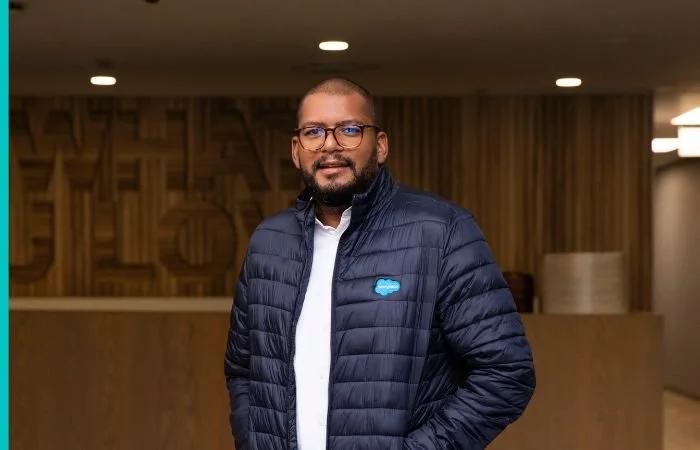Meet James Eaton, CEO and co-founder of IONETIC
I’m James, the CEO and co-founder at IONETIC. Before starting IONETIC I studied Mechanical Engineering at Imperial College London, where I went on to become a researcher at the Electrochemical Science and Engineering Group there (more colloquially known as the battery group). I grew up in Yorkshire and love playing piano and guitar, as well as being a massive Manchester United fan – hope that doesn’t put anyone off from reading on!
My Co-Founder Monica Marinescu is a Senior Lecturer, also in the battery group, at Imperial College London.
There’s always a lightbulb moment before the beginning of a new venture. What was that moment for you?
I was speaking to several smaller vehicle companies in the UK and noticed that many were in critical need of support in all stages of the battery pack value chain – from having the initial vision to producing a vehicle-ready, fully optimised battery.
The existing options available to them were either poor engineering solutions, too expensive, or took too long to develop. It became clear that a business like IONETIC was needed, especially for the smaller and niche manufacturers who often need something bespoke and don’t meet the minimum order quantities of many global battery pack providers.
Tell us about your experience prior to launching your business.
While studying for my Engineering Degree, I focused on designing and building battery packs. I investigated the latest technologies in battery pack design and performance, with a focus on automotive applications. It was throughout my research work that I noticed I was often the expert in the room when discussing batteries for electric vehicles even with people who’d worked in automotive for 20 years but worked on combustion.
What inspired you to launch your business and what is the end goal?
I felt I could make a difference. I had the knowledge of battery packs and a vision for how to help companies electrify. The end goal is to be the go-to for battery pack design and manufacture in Europe, and save over 100,000 tonnes of CO2 from entering the atmosphere by 2027.
What’s the biggest lesson you’ve learnt so far as an entrepreneur?
Timing and timelines are key! This applies to so many aspects of the business. Sending an email with a form attached or a task to do be done, without timelines is a sure-fire way to be left waiting - instead it’s always better to ask for something with specific times and dates.
It’s also important when you’re looking at goals and strategy. Make sure you’re tracking your company against what you want to achieve, and your progress towards achieving that.
What does your business offer its target audience?
We offer a better battery pack solution. We can take customers through every step - from requirements through validation, homologation, scale-up, and manufacture. We can leverage our design platform to get to solutions faster, meaning that we speed up time to market. By optimising for both design and manufacture, as well as having a common platform across customers, we significantly reduce the cost.
What’s the most common problem your customers approach you with?
There are a few. The main issues customers face are that there’s no clear manufacturing supply chain (at least if you want your battery pack made in the UK and Europe) and that costs are too high. Plus, many of the solutions available now aren’t great engineering solutions with either low energy density, requirements sacrifice, or low volume utilisation.
How do you set yourself apart from other businesses in your industry?
Most of our customers don’t meet the minimum order quantities for many of the global battery pack suppliers and need a cheaper bespoke option. That’s where we come in. Designed with flexibility and customisation at its heart, our platform enables each battery pack concept to be adjusted cell by cell – creating a solution that efficiently utilises the available space, increases energy density and meets customers’ specific packaging requirements.
What is your day-to-day role with the company?
I’m not a morning person so I’m in the office normally around 10 am. On Mondays, we have our weekly kick-off where we make sure everyone’s clear on their goals, and people can identify any problems they have or dependencies. Then it’s normally the usual meetings, emails, and creating presentations and documents.
I spend time doing engineering too, whether setting out product specification documents or setting up tests in the lab – although this is now becoming less frequent.
I’m not sure who said it first, but it’s true that in a start-up you work until 6 pm - and then the work actually starts! While we’re scaling up, anything we don’t have covered also falls to me, like reconciling our accounts or HR.
Describe your business in three words.
Making electrification easier
How have you seen the need for richer analytics and data evolve over the years?
Data is such a big part of what we do. Everything we build, we build with scale in mind. When we build battery test procedures or test rigs, we think about how they’ll work when we have thousands of tests running.
We’re also big on data availability internally. We’re making sure that every test we run can be used in the future for model validation and data analytics. We’re also building out a data team focused solely on making the most out of the available data and creating really optimised workflows so engineers can focus on creating solutions; not copy and pasting data and running code.








